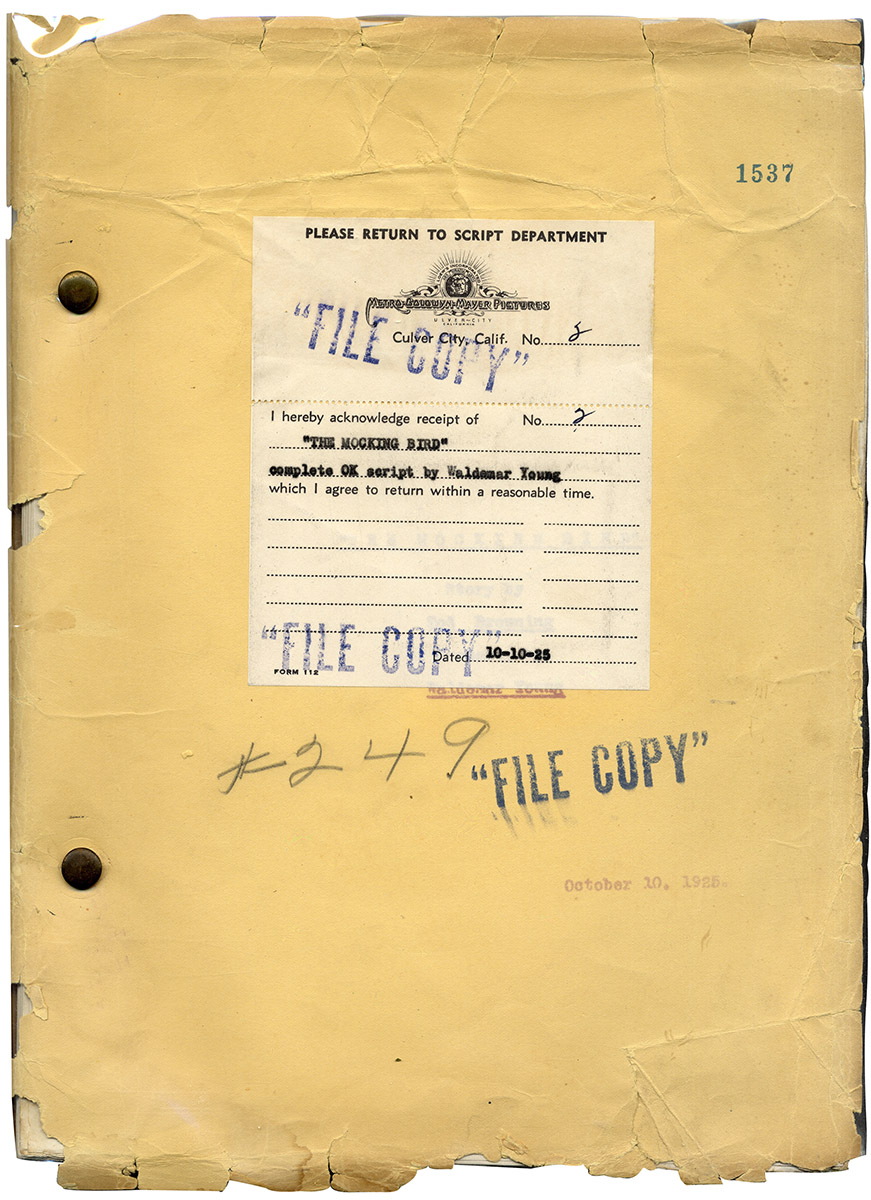Tod Browning (director) THE BLACKBIRD [working title: THE MOCKING BIRD] (Oct 10, 1925) Film script
[Los Angeles]: MGM, 1925. Vintage original film script. Tan titled wrappers, 12 x 8 3/4″ (31 x 22 cm.), dated Oct. 10, 1925 (under working title THE MOCKING BIRD), with credits for screenwriter Waldemar Young. Title page integral with the first page of the text, with credits for screenwriters Tod Browning and Waldemar Young. 120 leaves, with last page of text numbered 119. Mimeograph, very good+ in good wrappers, with typical chipping at yapped edges. Brad bound.
The Blackbird (1926) was the fourth of character actor Lon Chaney, Sr.’s ten collaborations with his favorite director, Tod Browning, following their prior joint efforts The Wicked Darling (1919), Outside the Law (1921) and The Unholy Three (1925).
Chaney, as he often did, plays a double role: he is Dan Tate, aka “The Blackbird”, the tough leader of a gang of thieves in London’s Limehouse District, and also his apparently deformed and noble twin brother “The Bishop”, who operates a charitable mission in Limehouse and who is actually Tate’s alter ego. The film’s screenplay was by Waldemar Young, the screenwriter of most of the Browning/Chaney vehicles, based on a story by Browning. It was produced by the legendary Irving Thalberg, who had previously supervised Chaney and Browning’s work as vice president of Universal Studios, and who took Chaney and Browning with him when he became production manager of the newly-amalgamated Metro-Goldwyn-Mayer in 1925 (after Chaney’s death, Thalberg would produce Browning’s 1932 masterpiece, Freaks).
The Blackbird is essentially a melodrama in which Chaney’s criminal character, Tate, is in love with a pretty music hall performer, Mademoiselle Fifi, played by Renée Adorée. Tate has a romantic rival, a seemingly upper-class Englishman named Bertram P. Glade (Owen Moore), who is actually another thief nicknamed “West End Bertie”. After attending one of Fifi’s performances with some of his society friends, Bertie arranges to have himself and his friends robbed by his own accomplices. Tate, learning of this scheme, forces Bertie to divide the loot between them. Fifi ultimately prefers Bertie to Tate. Bertie agrees to reform for Fifi’s sake and asks Tate’s alter ego, the crippled Bishop, to marry them!
On the one hand, The Blackbird is a proto-gangster film in which Chaney’s characterization foreshadows the kind of roles played by Edward G. Robinson, James Cagney and Humphrey Bogart in the 1930s. On the other hand, the film showcases director Browning’s fascination with trickery and illusion, and the ironic blurring of fakery and truth. Fifi’s music hall act is a grotesque puppet show set against a black backdrop in which Fifi’s living human head has a marionette’s body. Neither Tate nor Bertie are what they appear to be. In order to convince others that he is actually two people, Tate has loud and violent arguments with himself behind closed doors. Injured while attempting to escape from the police, Tate, the fake cripple, becomes a real cripple. Then, in order to avoid being examined by a doctor (which would expose his prior masquerade) Tate floridly pretends to die, but when the doctor arrives, is actually discovered to be dead. Recipients of Tate’s charity gathered around the homicidal gangster’s deathbed praise him for his life of good works.
Audiences and critics at the time were thrilled with Chaney’s performance, particularly his ability to physically transform himself on-screen from criminal to deformed cripple and back again.
Related products
-

SEARCHING WIND, THE (Nov 7, 1946) Final White script by Lillian Hellman
$1,500.00 Add to cart -

Mark Twain (source) LIFE ON THE MISSISSIPPI (ca. 1956) TV script adapted by William Robert Yates
$300.00 Add to cart -

DRESS GRAY (Mar 6, 1981) Second revision script by Gore Vidal
$500.00 Add to cart -

PRICK UP YOUR EARS (May 1985) Revised film script
$650.00 Add to cart

